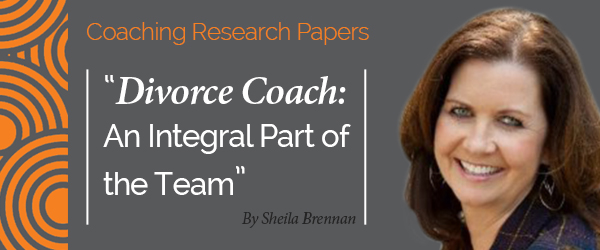Research Paper By Sheila Brennan
(Divorce Coach, UNITED STATES)
Abstract
Divorce is a life transition that is often full of emotion and turmoil. People involved in divorce are expected to make significant legal and financial decisions at a time when they are not at their peak state mentally or emotionally. The professionals approached during the early stages of marriage dissolution are attorneys. Often attorneys are the only experts whose services are retained. Because of the complexities of asset/debt distribution, parenting plans and high emotions involved in ending a marriage, the parties should engage the services of other professionals, including a divorce coach.
Divorce Coach: An Integral Part of the Team
Divorce is a life altering event that impacts a person and family legally, financially, emotionally and socially. It’s one of life’s significant transitions. Legally at the end of the process, the litigants are unmarried and the marriage has been dissolved. The hope is that the individuals involved will walk away, determined to begin a new and better life. (Felder & Victor, 2011, p. 3)
When people go through major life transitions, they rely on team support to assist in the shift. Gary Hadler (2009, para.11) published an article that identifies when a situation is best resolved using a group approach. When one seeks help, advice and opinions on a 1:1 basis, the decision maker usually retains overall responsibility for the outcome. In a group, the originator can either veto the group’s decision or assume one vote in the final decision or agree to accept the decision of the collective group.
When dealing with a complex issue and one that would benefit from group decision making, Hadler (2008, paras. 6-10) recommends a team methodology to reaching a solution. He recommends reviewing the following questions. If you answer “Yes” to most of them, then a group approach is suggested:
With regards to divorce, the answer to the questions is “Yes!” Unfortunately, those faced with divorce usually have limited knowledge about the process. Well intentioned friends, family and colleagues will give you a “should” list although not necessarily based on experience or knowledge. Unfortunately, at this time in your life, you struggle to make clear decisions. For most, divorce is debilitating, if not devastating, experience. On the heels of disbelief follow fear and bewilderment. (Power, 2003, p. 5)
Because divorce is so prevalent in our society, it is often referred to as a “normal” life event. Yet the experiences, thoughts, feelings and behaviors you experience during the divorce process are far from normal. One may find themselves feeling crazy, suicidal, like a zombie, depressed, helpless, homicidal and/or having feelings of being in someone else’s life. (Belli & Krantzler, 1988, p. 106)
When human beings experience stress, they often say that they are not able to “think straight” or “fully process” ideas. During stress, people rely on the part of the brain that makes quick decisions, the limbic system, and this directly interferes with the part of the brain used for reflection and analysis, the prefrontal cortex. (Goleman, 1996, p. 87) Yet people who face divorce are often making some of the most important legal and financial decisions of their lives without the benefit of a partner.
Because those faced with divorce are not necessarily able to make the best decisions, it’s a good idea to enlist the services of a professional team. The following list provides criteria for choosing a successful team. Each professional should possess as many of the traits as possible. According to Brounstein, the following attributes makes great team members: (Brounstein, 2012, paras. 3-28):
